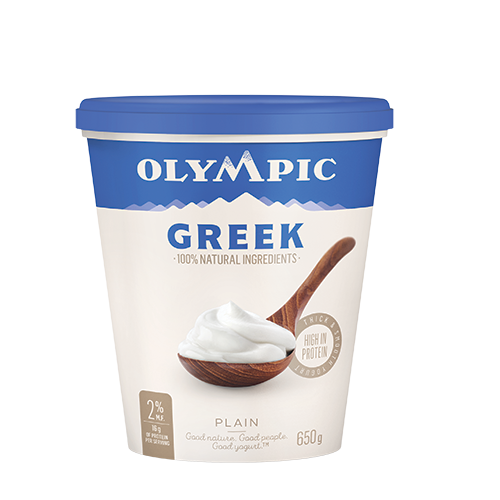FAQs
If the store already carries Lactalis Canada products, you may ask the manager of the dairy section to order the product you are looking for. If the product is still not on the shelves, contact us and we will gladly help you locate the product in your area.
No! In Canada, the use of growth hormones is prohibited for dairy cows and antibiotic use must comply with Canadian law. In addition, milk is tested at the plant for antibiotics. If antibiotics were found in the milk, the milk would be discarded.
Lactalis Canada uses only 100% Canadian milk in the production of its products. The symbol is a seal of origin that guarantees the dairy products you’re buying are made entirely from 100% Canadian milk or milk ingredients.
The only animal by-products used in our products are milk, cream and milk powder and milk proteins. All of our yogurts are gelatin-free.
All Olympic dairy products are Kosher certified (COR) by the Kashruth Council of Canada
No. Lactose intolerance is caused by a decrease in the body’s production of lactase. Lactase is an enzyme that helps digest lactose, the natural sugar found in milk. The most common symptoms are swelling, cramps and diarrhea. On the other hand, a dairy allergy is an immunological reaction to casein, the protein found in milk.
Yes! Our sister brand, iögo, makes delicious varieties of lactose free yogurt. For more information on these products, click here: https://www.iogo.ca/en/products/.“
Although our facilities are not certified as gluten free, our products do not contain any ingredients derived from gluten. Products that do contain gluten are labeled accordingly.
No, we don’t use any of these ingredients in our yogurts. Our yogurts are made from 100% natural ingredients.
This liquid is called lactoserum. It contains several nutritious elements such as vitamins, calcium and other minerals. It may happen that lactoserum appears on the surface of a yogurt because of a natural separation process. A quick stir will incorporate it into the yogurt as well as its health benefits.
Yes, all our organic products are certified by FVOPA (Fraser Valley Organic Producers Association), an organization under the authority of the COABC (Certified Organic Association of BC). The organic certified logo also attests to this certification.
Yes, all our products are both pasteurized and homogenized; active cultures are added afterwards to ensure that they remain live throughout the lifecycle of the product.
Balkan yogurt is a firm yogurt that is set directly in its original container. Many of our Organic Balkan-style yogurts are also probiotic. Traditional Greek-style yogurt involves straining yogurt to increase its firmness. Greek-style yogurt has more protein when compared to Balkan-style yogurt.
Several strains are used in the production of our yogurts. They are added after the pasteurization and homogenization processes to ensure that they remain active throughout the lifecycle of the product.
Active bacterial cultures and probiotic cultures are two different ingredients. Active bacterial cultures are part of yogurt fabrication. Bacterial cultures will digest the milk and cream and result in a creamy yogurt. Probiotic cultures have a positive effect on the digestive system and are always listed in the ingredients lists of our products.
Probiotics are live microorganisms that have a positive effect on gut health when consumed. They are best described as live healthy bacteria that aid digestion.
The most important factor in retaining the quality of the yogurt is temperature control. Yogurt, like all dairy products, should be stored at a temperature between 1°C and 4°C. Place yogurt in the refrigerator quickly as even short periods of time at room temperature can cause off flavors and spoilage before the ‘‘best before’’ date. Moreover, as yogurt is sensitive to odors, store it away from strong smelling food.
Yogurt is a perishable item. Therefore, this date is required to advise consumers of the products’ shelf life. The date indicates the end of the period during which the product retains its full flavor and nutritional value when kept at a temperature between 1°C and 4°C. It is not recommended to consume dairy products after their expiry date.
Freezing does not affect the nutritional value of yogurt, but the texture will be greatly affected. Thus, we do not recommend that you freeze yogurt.
Yes, the 1,75 kg packaging does not have a plastic seal under the lid but has security loops that acts as tamper evident tabs. When the container is open for the first time, the security loops located on each corner cracks open showing the container has not been tampered with or previously opened.
Yes, Olympic yogurt containers are in fact recyclable and made of plastic number 5. However, our inner seals and 100 g foils are not recyclable. We are constantly working on earth-friendly solutions that evolve with consumer needs.
Only cows that produce our organic milk used for our organic yogurts are grass-fed. For the rest of our products, forages are the main part of the diet of dairy cattle. Depending on the region, the climate, the animal’s life stage and other factors, different forages are offered in different proportions to dairy cattle: alfalfa, clover, timothy, corn, soybeans, etc.

